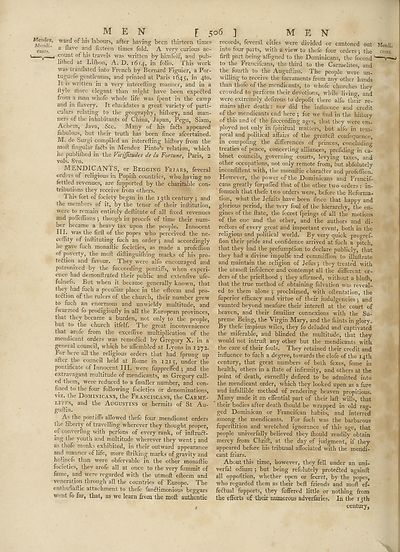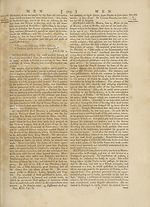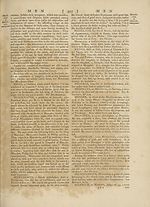Encyclopaedia Britannica, or, a Dictionary of arts, sciences, and miscellaneous literature : enlarged and improved. Illustrated with nearly six hundred engravings > Volume 13, MAT-MIC
(548) Page 506
Download files
Complete book:
Individual page:
Thumbnail gallery: Grid view | List view

MEN [ 506 ] MEN
Memloz, ward of his labours, after having been thirteen times
canV" a ^ave anc^ fifteen times fold. A very curious ac-
——t 1 count of his travels was Avritten by himfelf, and pub-
lifhed at Lifbon, A. D. 1614, in folio. This Avork
Avas tranflated into French by Bernard Figuier, a Por-
tuguefe gentleman, and printed at Paris 1645, 111 4to*
It is Avritten in a very interefting manner, and in a
llyle more elegant than might have been expended
from a man wliofe Avhole life Avas fpent in the camp
and in flavery. It elucidates a great variety of parti¬
culars relating to the geography, hiftory, and man¬
ners of the inhabitants of China, Japan, Pegu, Siam,
Achem, Java, &c. Many of his faffs appeared
fabulous, but their truth has been fince afcertained.
M. de Surgi compiled an interefting hiftory from the
molt lingular faffs in Mendez Pinto’s relation, which
he publilhed in the ViciJJitudes de la Fortune, Paris, 2
vols. 8ArO.
MENDICANTS, or Begging Friars, feveral
orders of religious in Popifti countries, Avho having no
fettled revenues, are fupported by the charitable con¬
tributions they receive from others.
This fort of fociety began in the 13th century ; and
the members of it, by the tenor of their inftitution,
were to remain entirely deftitute of all fixed revenues
and poiTeflions ; though in procefs of time their num¬
ber became a heavy tax upon the people. Innocent
HI* was the firft of the popes Avho perceived the ne-
ceffity of inftituting fuch an order ; and accordingly
he gave fuch monaftic focieties, as made a profeflion
of poverty, the moft diftinguilhing marks of his pro-
teftion and favour. They Avere alfo encouraged and
patronized by the fucceeding pontiffs, Arhen experi¬
ence had demonftrated their public and extenfive ufe-
fulnefs. But when it became generally knoAvn, that
they had fuch a peculiar place in the efteem and pro-
teffion of the rulers of the church, their number greAV
to fuch an enormous and umvieldy multitude, and
Inarmed fo prodigioufiy in all the European provinces,
that they became a burden, not only to the people,
but to the church itfelf. The great inconvenience
that arofe from the exceftive multiplication of the
mendicant orders Avas remedied by Gregory X. in a
general council, Avhich he affembled at Lyons in 1272.
For here all the religious orders that had fprung up
after, the council held at Rome in 1215, under the
pontificate of Innocent III. Avere fuppreffed ; and the
extravagant multitude of mendicants, as Gregory call¬
ed them, Avere reduced to a fmaller number, and con¬
fined to the four folloAving focieties or denominations,
viz. the Dominicans, the Franciscans, the Carme¬
lites, and the Augustins or hermits of St Au-
guftin.
As the pontiffs alloAved thefe four mendicant orders
the liberty of travelling AvhereATr they thought proper,
of converfing Avith perfons of every rank, of inftruft-
ing the youth and multitude Avherever they Avent 5 and
as thofe monks exhibited, in their outAvard appearance
and manner of life, more ftriking marks of gravity and
holinefs than Avere obfervable in the other monaftic
focieties, they arole all at once to the very fummit of
fame, and Avere regarded Avith the utmoft efteem and
veneration through all the countries of Europe. The
enthufiaftic attachment to thefe fanftimonious beggars
\Arent fo far, that, as avc learn from the moft authentic
records, feveral cities Avere divided or cantoned out Mendi.
into four parts, Avith a vie ay to thefe four orders 5 the cants."
firft part being alfigned to the Dominicans, the fecond 'T'-
to the Francileans, the third to the Carmelites, and
the fourth to the Auguftins. The people Avere un-
widling to receive the i'acraments from any other hands
than thofe of the mendicants, to Avhofe churches they
croAvdcd to perform their devotions, Avhile living, and
Avere extremely defirous to depofit there alfo their re¬
mains after death: nor did the influence and credit
of the mendicants end here j for avc find in the hiftory
of this and of the fucceeding ages, that they Avere em¬
ployed not only in fpiritual matters, but alfo in tem¬
poral and political affairs of the greateft confequence,
in compofing the differences of princes, concluding
treaties of peace, concerting alliances, prefiding in ca¬
binet councils, governing courts, levying taxes, and
other occupations, not only remote from, but ablolutely
inconfiftent Avith, the monaftic character and profeflicn.
HoAvever, the power of the Dominicans and Francif-
cans greatly furpaffed that of the other tAvo orders : in-
fomuch that thefe two orders Avere, before the Reforma¬
tion, Avhat the Jeluits have been fince that happy and
glorious period, the very foul of the hierarchy, the en¬
gines of the ftate, the fecret fprings of all the motions
of the one and the other, and the authors and di-
redlors of every great and important event, both in the
religious and political Avorld. By very quick progref-
fion their pride and confidence arrived at fuch a pitch,
that they had the prefumption to declare publicly, that
they had a divine impulfe and commiflion to illuftrate
and maintain the religion of Jefus 5 they treated Avith
the utmoft infolence and contempt all the different or¬
ders of the priefthood ; they affirmed, Avithout a blulh,
that the true method of obtaining falvation ay as reveal¬
ed to them alone ; proclaimed, Avith oftentation, the
fuperior efficacy and virtue of their indulgencies 5 and
vaunted beyond meafure their intereft at the court of
heaven, and their familiar connexions Avith the Su¬
preme Being, the Virgin Mary, and the faints in glory.
By thefe impious Aviles, they fo deluded and captivated
the miferable, and blinded the multitude, that they
Avould not intruft any other but the mendicants with
the care of their fouls. They retained their credit and
influence to fuch a degree, towards the clofe of the 14th
century, that great numbers of both fexes, fome in
health, others in a ftate of infirmity, and others at the
point of death, earneftly defired to be admitted into
the mendicant order, Avhich they looked upon as a fure
and infallible method of rendering heaven propitious.
Many made it an effential part of their laft wills, that
their bodies after death fhould be Avrapped in old rag¬
ged Dominican or Francifcan habits, and interred
among the mendicants. For fuch Avas the barbarous
fuperftition and Ainetched ignorance of this age, that
people univerfally believed they fhould readily obtain
mercy from Chrift, at the day of judgment, if they
appeared before his tribunal affociated with the mendi¬
cant friars.
About this time, however, they fell under an uni-
verfal odium ; but being refolutely prote&ed againft
all oppofition, Avhether open or fecret, by the popes,
Avho regarded them as their beft friends and moft ef¬
fectual fupports, they fuffered little or nothing from
the efforts of their numerous adverfaries. In the 15th
century,
Memloz, ward of his labours, after having been thirteen times
canV" a ^ave anc^ fifteen times fold. A very curious ac-
——t 1 count of his travels was Avritten by himfelf, and pub-
lifhed at Lifbon, A. D. 1614, in folio. This Avork
Avas tranflated into French by Bernard Figuier, a Por-
tuguefe gentleman, and printed at Paris 1645, 111 4to*
It is Avritten in a very interefting manner, and in a
llyle more elegant than might have been expended
from a man wliofe Avhole life Avas fpent in the camp
and in flavery. It elucidates a great variety of parti¬
culars relating to the geography, hiftory, and man¬
ners of the inhabitants of China, Japan, Pegu, Siam,
Achem, Java, &c. Many of his faffs appeared
fabulous, but their truth has been fince afcertained.
M. de Surgi compiled an interefting hiftory from the
molt lingular faffs in Mendez Pinto’s relation, which
he publilhed in the ViciJJitudes de la Fortune, Paris, 2
vols. 8ArO.
MENDICANTS, or Begging Friars, feveral
orders of religious in Popifti countries, Avho having no
fettled revenues, are fupported by the charitable con¬
tributions they receive from others.
This fort of fociety began in the 13th century ; and
the members of it, by the tenor of their inftitution,
were to remain entirely deftitute of all fixed revenues
and poiTeflions ; though in procefs of time their num¬
ber became a heavy tax upon the people. Innocent
HI* was the firft of the popes Avho perceived the ne-
ceffity of inftituting fuch an order ; and accordingly
he gave fuch monaftic focieties, as made a profeflion
of poverty, the moft diftinguilhing marks of his pro-
teftion and favour. They Avere alfo encouraged and
patronized by the fucceeding pontiffs, Arhen experi¬
ence had demonftrated their public and extenfive ufe-
fulnefs. But when it became generally knoAvn, that
they had fuch a peculiar place in the efteem and pro-
teffion of the rulers of the church, their number greAV
to fuch an enormous and umvieldy multitude, and
Inarmed fo prodigioufiy in all the European provinces,
that they became a burden, not only to the people,
but to the church itfelf. The great inconvenience
that arofe from the exceftive multiplication of the
mendicant orders Avas remedied by Gregory X. in a
general council, Avhich he affembled at Lyons in 1272.
For here all the religious orders that had fprung up
after, the council held at Rome in 1215, under the
pontificate of Innocent III. Avere fuppreffed ; and the
extravagant multitude of mendicants, as Gregory call¬
ed them, Avere reduced to a fmaller number, and con¬
fined to the four folloAving focieties or denominations,
viz. the Dominicans, the Franciscans, the Carme¬
lites, and the Augustins or hermits of St Au-
guftin.
As the pontiffs alloAved thefe four mendicant orders
the liberty of travelling AvhereATr they thought proper,
of converfing Avith perfons of every rank, of inftruft-
ing the youth and multitude Avherever they Avent 5 and
as thofe monks exhibited, in their outAvard appearance
and manner of life, more ftriking marks of gravity and
holinefs than Avere obfervable in the other monaftic
focieties, they arole all at once to the very fummit of
fame, and Avere regarded Avith the utmoft efteem and
veneration through all the countries of Europe. The
enthufiaftic attachment to thefe fanftimonious beggars
\Arent fo far, that, as avc learn from the moft authentic
records, feveral cities Avere divided or cantoned out Mendi.
into four parts, Avith a vie ay to thefe four orders 5 the cants."
firft part being alfigned to the Dominicans, the fecond 'T'-
to the Francileans, the third to the Carmelites, and
the fourth to the Auguftins. The people Avere un-
widling to receive the i'acraments from any other hands
than thofe of the mendicants, to Avhofe churches they
croAvdcd to perform their devotions, Avhile living, and
Avere extremely defirous to depofit there alfo their re¬
mains after death: nor did the influence and credit
of the mendicants end here j for avc find in the hiftory
of this and of the fucceeding ages, that they Avere em¬
ployed not only in fpiritual matters, but alfo in tem¬
poral and political affairs of the greateft confequence,
in compofing the differences of princes, concluding
treaties of peace, concerting alliances, prefiding in ca¬
binet councils, governing courts, levying taxes, and
other occupations, not only remote from, but ablolutely
inconfiftent Avith, the monaftic character and profeflicn.
HoAvever, the power of the Dominicans and Francif-
cans greatly furpaffed that of the other tAvo orders : in-
fomuch that thefe two orders Avere, before the Reforma¬
tion, Avhat the Jeluits have been fince that happy and
glorious period, the very foul of the hierarchy, the en¬
gines of the ftate, the fecret fprings of all the motions
of the one and the other, and the authors and di-
redlors of every great and important event, both in the
religious and political Avorld. By very quick progref-
fion their pride and confidence arrived at fuch a pitch,
that they had the prefumption to declare publicly, that
they had a divine impulfe and commiflion to illuftrate
and maintain the religion of Jefus 5 they treated Avith
the utmoft infolence and contempt all the different or¬
ders of the priefthood ; they affirmed, Avithout a blulh,
that the true method of obtaining falvation ay as reveal¬
ed to them alone ; proclaimed, Avith oftentation, the
fuperior efficacy and virtue of their indulgencies 5 and
vaunted beyond meafure their intereft at the court of
heaven, and their familiar connexions Avith the Su¬
preme Being, the Virgin Mary, and the faints in glory.
By thefe impious Aviles, they fo deluded and captivated
the miferable, and blinded the multitude, that they
Avould not intruft any other but the mendicants with
the care of their fouls. They retained their credit and
influence to fuch a degree, towards the clofe of the 14th
century, that great numbers of both fexes, fome in
health, others in a ftate of infirmity, and others at the
point of death, earneftly defired to be admitted into
the mendicant order, Avhich they looked upon as a fure
and infallible method of rendering heaven propitious.
Many made it an effential part of their laft wills, that
their bodies after death fhould be Avrapped in old rag¬
ged Dominican or Francifcan habits, and interred
among the mendicants. For fuch Avas the barbarous
fuperftition and Ainetched ignorance of this age, that
people univerfally believed they fhould readily obtain
mercy from Chrift, at the day of judgment, if they
appeared before his tribunal affociated with the mendi¬
cant friars.
About this time, however, they fell under an uni-
verfal odium ; but being refolutely prote&ed againft
all oppofition, Avhether open or fecret, by the popes,
Avho regarded them as their beft friends and moft ef¬
fectual fupports, they fuffered little or nothing from
the efforts of their numerous adverfaries. In the 15th
century,
Set display mode to:
![]() Universal Viewer |
Universal Viewer | ![]() Mirador |
Large image | Transcription
Mirador |
Large image | Transcription
Images and transcriptions on this page, including medium image downloads, may be used under the Creative Commons Attribution 4.0 International Licence unless otherwise stated. ![]()
| Permanent URL | https://digital.nls.uk/192668286 |
|---|
| Attribution and copyright: |
|
|---|
| Description | Ten editions of 'Encyclopaedia Britannica', issued from 1768-1903, in 231 volumes. Originally issued in 100 weekly parts (3 volumes) between 1768 and 1771 by publishers: Colin Macfarquhar and Andrew Bell (Edinburgh); editor: William Smellie: engraver: Andrew Bell. Expanded editions in the 19th century featured more volumes and contributions from leading experts in their fields. Managed and published in Edinburgh up to the 9th edition (25 volumes, from 1875-1889); the 10th edition (1902-1903) re-issued the 9th edition, with 11 supplementary volumes. |
|---|---|
| Additional NLS resources: |
|

